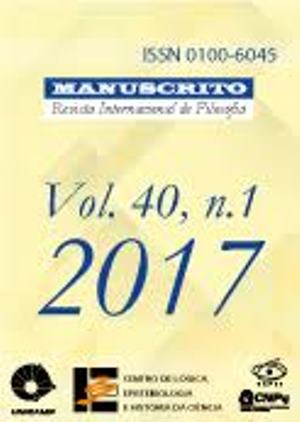Resumo
The well-known phenomenological argument draws metaphysical conclusions about time, specifically about change through time and the resulting passage or flow of time, from our temporal experience. The argument begins with the phenomenological premise that there is a class of properties which underlies our experience of time and change through time, and its conclusion is that these properties are not merely experienced but exemplified. I argue that the phenomenological argument is best served by the adoption of a representational theory of perception. I then present a representational theory of temporal experience.Referências
ALMANG, J. Tense as a Feature of Perceptual Content, Journal of Philosophy 111 (7): 361-378, 2014.
BROAD, C. D. An Investigation of McTaggart’s Philosophy Vol. II., Part 1, Cambridge: Cambridge University Press, 1938.
BROAD, C. D. Scientific Thought, London: Routledge and Kegan Paul, 1923.
BYRNE, A. Intentionalism Defended, Philosophical Review, 110 (2): 199239, 2001.
CRANE, T. Is There a Perceptual Relation, in Tamar Gendler and John Hawthorne, eds., Perceptual Experience, New York: Oxford University Press: 126-145, 2008.
DAINTON, B. The experience of Time and Change, Philosophy Compass, 3 (4): 619-638, 2008.
DAINTON, B. Time and Space, Ithaca: McGill-Queen's University Press, 2001.
DAINTON, B. Stream of Consciousness, London: Routledge, 2000.
CRAIG, W. L. On the Truth Conditions of Tensed Sentence Types, Synthese, 120 (2): 265-270, 1999.
CROWTHER, T. Two Conceptions of Conceptualism and Nonconceptualism, Erkenntnis, 65 (2): 245-276, 2006.
DENG, N. Our experience of passage on the B-Theory, Erkenntnis 78 (4): 713-726, 2013.
DRETSKE, F. Naturalizing the Mind, Cambridge: MIT Press, 1995.
DRETSKE, F. Explaining Behaviour, Cambridge: MIT Press, 1998.
DRETSKE, F. Knowledge and the Flow of Information, Cambridge: MIT Press, 1981.
EVANS, G. Varieties of Reference, McDowell, J. (ed.), New York: Oxford University Press, 1982.
DYKE, H. Temporal Language and Temporal Reality, The Philosophical Quarterly, 53 (212): 380-391, 2003.
FODOR, J. Psychosemantics, Cambridge: MIT Press, 1987.
FRISCHHUT, A. What Experience Cannot Teach Us About Time, Topoi 34 (1): 143-155, 2015.
HARMAN, G. The Intrinsic Quality of Experience, Philosophical Perspectives, Volume 4: 31-52, 1990.
HOERL, C. Time and tense in perceptual experience, Philosophers Imprint 9 (12):1–18, 2009.
HUSSERL, E. The Phenomenology of Internal Time-Consciousness, J. Churchill trans., The Hague: Marinus Hijhoff, 1964.
JAMES, W. The Principles of Psychology, New York: Dover, 1890.
KELLY, S. D. The Puzzle of Temporal Experience, in Kathleen Akins ed., Cognition and the Brain, New York: Cambridge University Press: 208-240, 2004.
LE POIDEVIN R. The Images of Time, Oxford: Oxford University Press, 2007.
MABBOTT, J. D. The Specious Present, Mind, 64 (225): 153-167, 1951.
MCDOWELL, J. Mind and World, Cambridge: Harvard University Press, 1994.
MCTAGGART, J. E. The Unreality of Time, Mind, 17 (68): 457-474, 1908.
MELLOR, D. H. Real Time II, New York: Routledge, 1988.
MILLER, I. Husserl, Perception, and Temporal Awareness, Cambridge: MIT Press, 1984.
MILLIKAN, R. Language, Thought and Other Biological Categories, Cambridge: MIT Press, 1984.
MOZERSKY, M. J. Time, language, and ontology: the world from the B-theoretic perspective, Oxford University Press: Oxford, 2015.
MUNDLE, C. W. K. How Specious is the Specious Present, Mind, 63 (249): 26-48, 1945.
OAKLANDER, L. N. Dolev’s anti-metaphysical realism: a critique, in Oaklander L. N. ed., Debates in the metaphysics of time, Bloomsbury: New York: 1-29, 2014.
OAKLANDER, L. N. Temporal Phenomena, Ontology and the R-theory, Metaphysica, (16) 2: 253-269, 2015.
OAKLANDER, L. N. A, B- and R-theories of time: a debate. In: Barton A (ed) The future of the philosophy of time. Routledge, London, 2012.
OAKLANDER, L. N. Presentism, ontology and temporal experience, Royal Institute of Philosophy Supplement, 50:73–90, 2002.
ORILIA, F. and OAKLANDER, L. N. Do we really need a new B-theory of time? Topoi 34 (1):157-170, 2014.
PAPINEAU, D. Representation and Explanation, Philosophy of Science, 51: 570-572, 1984.
PAUL L. A. Temporal Experience, The Journal of Philosophy, CVII (7): pp. 333-359, 2010.
PAUL L. A. Truth Conditions of Tensed Sentence Types, Synthese 111: pp. 53-71, 1997.
PEACOCKE, C. Sense and Content, Oxford: Oxford University Press, 1983.
PEACOCKE, C. A Study of Concepts, Oxford: Oxford University Press, 1992. PROSSER, S. Could we Experience the Passage of Time?, Ratio 20 (1): 75 90, 2007.
SIEGEL, S. Cognitive Penetrability and Perceptual Justification, Nous 46 (2): 201-222, 2011.
SKOW, B Experience and the passage of time, Philosophical Perspectives 25(1): 359–387, 2011.
SMITH, A. D. Translucent Experiences, Philosophical Studies, 140 (2): 197212, 2008.
SMITH, Q. Language and Time, New York: Oxford University Press, 1993.
SPEAKS, J. Is There a Problem about Nonconceptual Content, Philosophical Review 114 (3): 359-98, 2005.
STAMPE, S. Toward a Causal Theory of Linguistic Representation, in French, Uehling, Wettstein eds., Midwest Studies in Philosophy 2: 263, 1997.
TYE, M. Consciousness and Persons, Cambridge: MIT Press, 2003.
TYE, M. Consciousness, Color, and Content, Cambridge: MIT Press, 2000.

